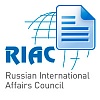Publications Review 27.02.2013
In
Login if you are already registered
(no votes) |
(0 votes) |
In this issue you will find: Political deadlock in Italy and its consequences for Germany; Asian counties comments on Pope Benedict XVI's resignation; Preparations for the first visit of Myanmar President Thein Sein to Europe; Six Party talks with Iran in Kazakhstan and more...
 George Washington University’s new Policy Alert (part of the Rising Powers Initiative), issued on February 26th is dedicated to Asian Countries Comments on the Pope’s Resignation. Here you can find out about reactions of government and church officials in South Korea, China and India to the Benedict XVI's decision to resign.
George Washington University’s new Policy Alert (part of the Rising Powers Initiative), issued on February 26th is dedicated to Asian Countries Comments on the Pope’s Resignation. Here you can find out about reactions of government and church officials in South Korea, China and India to the Benedict XVI's decision to resign.
Priest Lee Kyung-sang of the Archdiocese of Seoul:
"People have a conservative image of Pope Benedict XVI. But through his resignation announcement, I believe he has shown a liberal and reformist mind"
 The main topic of Council on Foreign Relations’ Daily Brief from the 26th of February is the effect of Italy's deadlock vote on the markets. According to Wall Street Journal, the results saw a spike in bond yields and a sharp sell-off in equities as investors faced political gridlock in the eurozone's third-largest economy.
The main topic of Council on Foreign Relations’ Daily Brief from the 26th of February is the effect of Italy's deadlock vote on the markets. According to Wall Street Journal, the results saw a spike in bond yields and a sharp sell-off in equities as investors faced political gridlock in the eurozone's third-largest economy.
The Brief also covers preparations for the first visit of Myanmar President Thein Sein to Europe, Six Party talks with Iran in Kazakhstan, future talks between Jonh Kerry and Syrian opposition, and other topics.
 Political deadlock in Italy is also in limelight of the recent issue of Rome-based "Other News". According to it, “the result of general and senatorial elections amounts to a rejection of the austerity policies of outgoing Prime Minister Mario Monti, who was the major loser”
Political deadlock in Italy is also in limelight of the recent issue of Rome-based "Other News". According to it, “the result of general and senatorial elections amounts to a rejection of the austerity policies of outgoing Prime Minister Mario Monti, who was the major loser”
 American Institute for Contemporary German Studies (AICGS) at Johns Hopkins University in its latest issue of AICGS Advisor, approaches the results of Italian election from a somewhat different angle. Senior Fellow Alexander Privitera explains that “the lack of a victorious majority will only mean prolonged instability for a country trying to bring stability and competitiveness back” and analyzes possible consequences of Italy’s electoral chaos for Germany.
American Institute for Contemporary German Studies (AICGS) at Johns Hopkins University in its latest issue of AICGS Advisor, approaches the results of Italian election from a somewhat different angle. Senior Fellow Alexander Privitera explains that “the lack of a victorious majority will only mean prolonged instability for a country trying to bring stability and competitiveness back” and analyzes possible consequences of Italy’s electoral chaos for Germany.
(no votes) |
(0 votes) |




